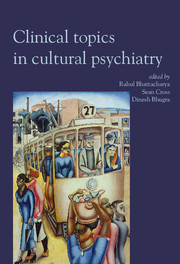Book contents
- Frontmatter
- Dedication
- Contents
- List of tables
- List of boxes
- List of figures
- List of contributors
- Preface
- Part 1 Theoretical and general issues
- Part 2 Specific mental health conditions across cultures
- 8 Schizophrenia in African–Caribbeans: contributing factors
- 9 Depression in immigrants and ethnic minorities
- 10 Attempted suicide among South Asian women
- 11 Mental health of the ageing immigrant population
- 12 Intellectual disability and ethnicity: achieving cultural competence
- 13 Culture and liaison psychiatry
- 14 Addiction in ethnic minorities
- 15 Sex and culture
- 16 Culture in child and adolescent psychiatry
- 17 Black and minority ethnic issues in forensic psychiatry
- 18 Cultural perspectives on eating disorders
- Part 3 Management issues in the cultural context
- Index
14 - Addiction in ethnic minorities
from Part 2 - Specific mental health conditions across cultures
Published online by Cambridge University Press: 02 January 2018
- Frontmatter
- Dedication
- Contents
- List of tables
- List of boxes
- List of figures
- List of contributors
- Preface
- Part 1 Theoretical and general issues
- Part 2 Specific mental health conditions across cultures
- 8 Schizophrenia in African–Caribbeans: contributing factors
- 9 Depression in immigrants and ethnic minorities
- 10 Attempted suicide among South Asian women
- 11 Mental health of the ageing immigrant population
- 12 Intellectual disability and ethnicity: achieving cultural competence
- 13 Culture and liaison psychiatry
- 14 Addiction in ethnic minorities
- 15 Sex and culture
- 16 Culture in child and adolescent psychiatry
- 17 Black and minority ethnic issues in forensic psychiatry
- 18 Cultural perspectives on eating disorders
- Part 3 Management issues in the cultural context
- Index
Summary
Summary This chapter describes the challenges that drug and alcohol addiction services face when providing care for service users from Black and minority ethnic groups. Initially, little was known about the pattern of substance misuse within each ethnic minority, as Black and minority ethnic service users appear to be underrepresented in these services, resulting in a paucity of data. Underreporting of addictions among this group of patients may account for this underrepresentation, and reasons for a lower level of engagement with addiction services need to be explored. Over the past decade there have been more studies that demonstrate the extent of substance misuse within specific minority ethnic groups as well as some biological and social factors that influence this. Drug and alcohol treatment services now face the challenge of responding to this new information so that they can provide a more accessible and improved service for these individuals.
There has been increasing concern that current addiction services have not been effective in meeting the needs of patients from ethnic minorities. The Home Office Briefing Delivering Drug Services to Black and Ethnic-Minority Communities (Sangster et al, 2002) highlighted this problem, stating that existing services appear more equipped to cater for the needs of the White population, citing strong evidence that Black and minority ethnic groups are underrepresented in addiction services. These problems were also acknowledged by the National Treatment Agency for Substance Misuse (2002), an organisation set up by the government in 2001 to improve drug treatments in the UK. This agency, having identified diversity as a key objective, recognised that significant sections of the population seemed to be excluded from treatment.
Before 2001, few high-impact peer-reviewed publications addressed the relationship between ethnicity and illicit drug use. Notably, as recently as 1995, the government strategy document Tackling Drugs Together (Department of Health, 1995) made no mention of ethnicity at all. A review of drug treatment services in England published in the following year did discuss ethnicity, but it concluded that there was insufficient evidence to judge whether patients from Black and minority ethnic backgrounds find drug treatment agencies less accessible than the rest of the drug-using population (Task Force to Review Services for Drug Misusers, 1996).
- Type
- Chapter
- Information
- Clinical Topics in Cultural Psychiatry , pp. 182 - 195Publisher: Royal College of PsychiatristsPrint publication year: 2010



